Black History, Slavery
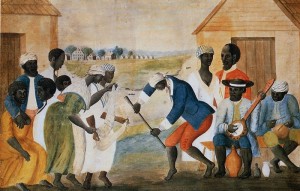 In 1654, John Casor became the first legal slave in America. Anthony Johnson, previously an African indentured slave, claimed John Casor as his slave. The Northampton County rule against Casor, and declared him propter for life by Anthony Johnson. Since Africans were not English, they were not covered by the English Common Law.
In 1654, John Casor became the first legal slave in America. Anthony Johnson, previously an African indentured slave, claimed John Casor as his slave. The Northampton County rule against Casor, and declared him propter for life by Anthony Johnson. Since Africans were not English, they were not covered by the English Common Law.
The First Black Slave was brought by the Dutch to the colony of Jamestown, 1619.
Black History, Education, Slavery
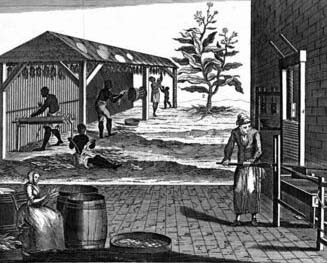 Soon after Union troops had captured and occupied the southern city of Natchez, Mississippi, in the summer of 1863, northern missionaries set about establishing the region’s first schools for freedpeople. But they were surprised to learn that at least one school already existed, and it had been in operation for many years.
Soon after Union troops had captured and occupied the southern city of Natchez, Mississippi, in the summer of 1863, northern missionaries set about establishing the region’s first schools for freedpeople. But they were surprised to learn that at least one school already existed, and it had been in operation for many years.
Even more astounding, the students at this school were slaves and so was their teacher, Lily Ann Granderson. (Other sources identify her as Milla Granson and Lila Grandison.) Although a small number of slaves learned to read and write in the antebellum South, schools for slaves and slave teachers were extraordinarily uncommon. (more…)
Black History, Slavery
Newspaper Report Of The Charles Deslondes Revolt Of 1811:
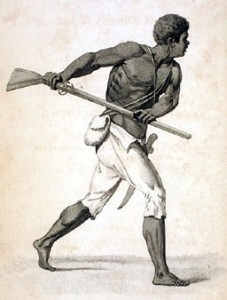
Charles Deslondes
In 1811, another “largest slave revolt in American history” took place in New Orleans, Louisiana. During this revolt about 500 enslaved Africans, armed with pikes, hoes, axes and a few firearms, marched on the city of New Orleans with flags flying and drums beating. Many of the slaves had participated in the Haitian Revolution. This revolt was led by Charles Deslondes, a mulatto from Saint Dominique, Haiti. They were well-organized and used military formation dividing themselves into companies commanded by various officers. They showed a variety of military formations, but collapsed in combat against a well- armed militia and regular army troops under General Wade Hampton.
The events were as followed. On January 8, 1811 the rebellion began late in the evening on the plantation of Colonel Manuel Andy located in the German Coast County, some thirty-six miles northwest of New Orleans near present-day Norco. According to contemporary sources the leader of the revolt was a mulatto “a yellow fellow,â€� probably of Santo Domigan or Jamaican origin. He was the property of the Widow Jean–Baptiste Deslondes at the time of the uprising. Charles Deslondes was in the temporary employment of Colonel Andry or Andre, the sources use alternate spellings of his name. (more…)
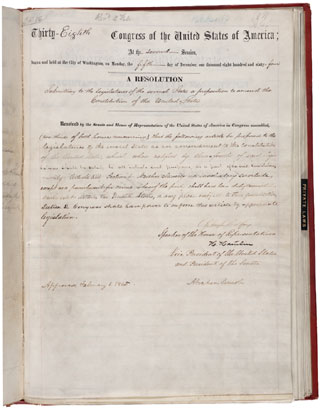
Black History, Law, Slavery
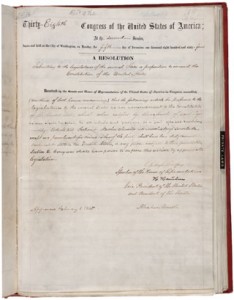 Passed by Congress on January 31, 1865, and ratified on December 6, 1865, the 13th amendment abolished slavery in the United States.
Passed by Congress on January 31, 1865, and ratified on December 6, 1865, the 13th amendment abolished slavery in the United States.
AMENDMENT XIII
SECTION 1.
Neither slavery nor involuntary servitude, except as a punishment for crime whereof the party shall have been duly convicted, shall exist within the United States, or any place subject to their jurisdiction.
SECTION 2.
Congress shall have power to enforce this article by appropriate legislation.
Black History, Slavery
 1727 – 1771. Ashby was the son of a black man and Mary Ashby, a white woman who was an indentured servant. He was born free because in Colonial times a child inherited his or her mother’s social status. But under Virginia law, he was also indentured until age 31 and was prohibited from meeting with slaves. Ashby worked as a messenger for Virginia governor Norborne Berkeley and as a carpenter. He acquired material goods, such as a silver watch, books, and candle-making equipment, that seemed out of reach of most black colonists.
1727 – 1771. Ashby was the son of a black man and Mary Ashby, a white woman who was an indentured servant. He was born free because in Colonial times a child inherited his or her mother’s social status. But under Virginia law, he was also indentured until age 31 and was prohibited from meeting with slaves. Ashby worked as a messenger for Virginia governor Norborne Berkeley and as a carpenter. He acquired material goods, such as a silver watch, books, and candle-making equipment, that seemed out of reach of most black colonists.
He married Ann Ashby, a slave of a bricklayer, and purchased her and their two enslaved children, John and Mary, in 1769 for 150 pounds. Although he owned them, Ashby had to petition the government to win their freedom. John and Mary attended Williamsburg’s Bray School.
Black History, Slavery
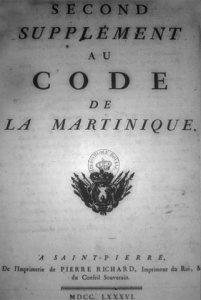 On 4 February 1794, the First Republic (Convention) voted for the abolition of slavery in all French colonies. The abolition decree stated that “the Convention declares the slavery of the Blacks abolished in all the colonies; consequently, all men, irrespective of colour, living in the colonies are French citizens and will enjoy all the rights provided by the Constitution.”
On 4 February 1794, the First Republic (Convention) voted for the abolition of slavery in all French colonies. The abolition decree stated that “the Convention declares the slavery of the Blacks abolished in all the colonies; consequently, all men, irrespective of colour, living in the colonies are French citizens and will enjoy all the rights provided by the Constitution.”
Restored by the Consulate in 1802, slavery was definitively abolished in 1848 by the Second Republic, on Victor Schoelcher’s initiative.
 In 1654, John Casor became the first legal slave in America. Anthony Johnson, previously an African indentured slave, claimed John Casor as his slave. The Northampton County rule against Casor, and declared him propter for life by Anthony Johnson. Since Africans were not English, they were not covered by the English Common Law.
In 1654, John Casor became the first legal slave in America. Anthony Johnson, previously an African indentured slave, claimed John Casor as his slave. The Northampton County rule against Casor, and declared him propter for life by Anthony Johnson. Since Africans were not English, they were not covered by the English Common Law.



